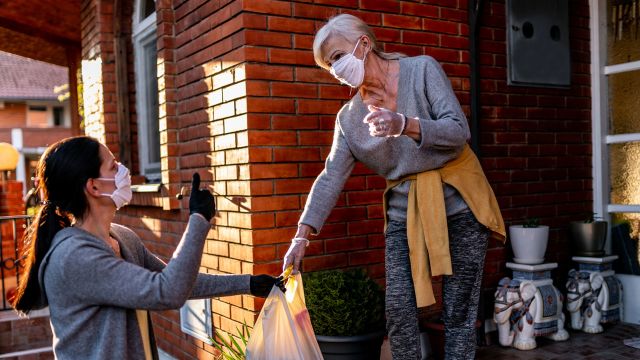Updated on November 5, 2021.
Although the COVID-19 pandemic has brought profound loss, despair, and distress to millions of people in the United States, the past two years have also witnessed remarkable displays of selflessness and generosity.
From frontline emergency workers risking their own lives to save others every day, to teachers keeping children engaged and learning despite personal risks and technological challenges, to neighbors simply looking out for fellow neighbors, kindness and compassion have kept the fabric of communities across the country intact.
Like so many of us, Paula Rosenthal, 54, was overcome by a sense of helplessness, stress, and anxiety when the world shut down at the beginning of the pandemic.
In fact, the percentage of Americans experiencing anxiety and depression jumped to 13.6 percent in April 2020 from 3.9 percent in 2018, according to a survey published in June 2020 in JAMA. Additional research over the past year has confirmed the mental health toll taken by the social isolation, financial strain, and general instability that have been hallmarks of the pandemic.
Seeking a way to help, Rosenthal sprang into action.
“I called a friend of mine who is the chair of emergency medicine at Long Island Jewish Forest Hills Northwell Health hospital and asked what I could do,” says Rosenthal, who lives on Long Island in New York State. “She mentioned that patients weren’t allowed to have visitors, and they would appreciate get-well cards.”
Working with her husband, Rosenthal created Operation Get Well. Together, they recruited a team of volunteers who have sent thousands of get-well cards to patients in hospitals across New York.
Like Rosenthal, many people have realized that one of the best antidotes to feeling helpless is taking action to make the world a better place by volunteering, either virtually or in person. As they’ve found, when you perform acts of kindness, not only does it give a lift to those you serve, but it can have powerful physical and emotional benefits for you, as well.
Finding purpose
A growing body of research shows that by helping others, you help yourself live a longer, healthier, and happier life. A June 2020 study published in the American Journal of Preventive Medicine suggests that adults older than 50 who volunteered for at least 100 hours annually lowered their risk of death and developing physical limitations. They also had lower rates of depressive symptoms and hopelessness and were more likely to be physically active. Not surprisingly, those who spent time helping others felt more optimistic and felt a stronger purpose in life.
The study did not find any connection between volunteering and a lower rate of chronic conditions, such as heart disease or hypertension—which makes it all the more interesting that volunteers had a 44 percent lower rate of dying during the four years they were followed over the course of the study.
“We observed that volunteering enhances other health and well-being outcomes including an enhanced sense of purpose in life and physical activity, which are independent pathways through which people might derive physical health benefits, including a reduced risk of mortality,” says the study’s lead author, Eric S. Kim, PhD, a research scientist in the Department of Social and Behavioral Sciences at the Harvard T.H. Chan School of Public Health.
Though the study was conducted before the COVID-19 crisis, Kim says the benefits of volunteering can certainly help in such a time of uncertainty and despair.
“My intuition is that volunteering would produce health and well-being benefits for people who are feeling disconnected due to the general state of the world today, because it will help enhance their sense of purpose in life as well as several other psychological protective factors,” he explains. Though his study looked at adults over age 50, Kim believes volunteering could bring physical and mental benefits to people of any age.
This study builds on earlier research, which shows that people who volunteer have higher rates of happiness, self-esteem, and a stronger sense of control over life. Volunteering has also been found to be particularly helpful for the emotional well-being of older Americans, giving them a stronger sense of purpose in life. This may be especially important for those suffering from the loss of loved ones or friends and those who may have lost their sense of identity after retiring from the workforce.
As you look for volunteer opportunities, keep this in mind:
Choose a cause that that aligns with your core values. Whether it’s working toward civil rights, volunteering at your place of worship, or tutoring at-risk children, choosing a project that is deeply meaningful to you will not only keep you motivated, but may even increase the health benefits, says Kim.
Make a long-term commitment. Jumping in to help for an hour or two here and there is always welcome, but Kim’s study found that the health and wellness benefits only accrued to those who volunteered more than 100 hours a year, which works out to about two hours a week.
Try going virtual. If the pandemic has taught us anything, it’s that there are ways to engage with others while remaining socially distant. Depending on your vaccination status and comfort level, you may be ready to engage with others in person. If not, there are still opportunities to lend a hand remotely, such as by connecting over Zoom with homebound seniors, donating money to worthy charities, or sending get-well cards.
“Once I started Operation Get Well, it not only helped the patients, but it has helped everyone who has participated,” says Rosenthal. “Being able to focus on something so positive during such a dark time in our history has been uplifting for us all.”







